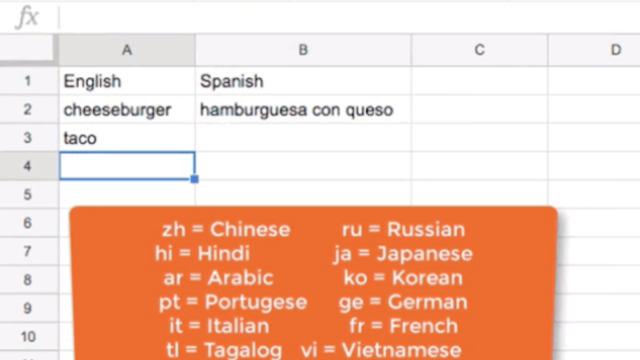There are more efficient ways of keeping track of important foreign language vocabulary than a hand-held dictionary. If you’re learning a new language or making basic translations, try using the Google Translate formula in Google Sheets for an easy access list of what you know — or want to know.
[referenced url=”https://www.lifehacker.com.au/2019/04/i-wish-id-learned-this-phrase-before-i-went-to-another-country/” thumb=”https://i.kinja-img.com/gawker-media/image/upload/t_ku-large/cu0lqpcihi98ixwtirvs.jpg” title=”I Wish I’d Learned This Phrase Before I Went To Another Country” excerpt=”Learning a language for a trip is different from learning it on a large scale; Duolingo is way too comprehensive, as is anything that tries to build up from fundamentals of grammar. You need a few phrases, like “please” and “thank you,” “What does this mean?” and “Where is the bathroom?”
But most of the time, I needed just one word to feel less like an ugly tourist. I needed to say I’m sorry. Which is more complicated than it sounds.”]
This method was posted to Reddit by u/mk4rim on r/LifeHacks, but the original information actually comes from tech writer and educator Jake Miller.
Miller shared this video in 2018, but it’s getting a new life on Reddit. At the time, he made this video showing the basic formulas that get plugged into Google Sheets to connect your spreadsheet to Google Translate:
Super cool, efficient way to support #ESL #ELL students in developing important English vocabulary. Setup a word list in #GoogleSheets and use the #GoogleTranslate formula! #GAFEChat #GAFE #ATChat #EduGIF https://t.co/pZvBOA43na pic.twitter.com/MZD3KZ9IUN
— Jake Miller (@JakeMillerTech) May 22, 2018
In a post on the topic, Miller writes:
Enter a word in one language in a cell, and then use the formula =GoogleTranslate(text, source_language, target_language) in another cell to automagically translate it! You can even drag the fill handle at the bottom of the formula cell down to apply this formula to more than one cell.
This formula appears to work for all languages supported by Google Translate, of which there are more than 100! It even outputs the results with the correct letters and alphabet–not just our ABC English letters. You’ll just need to know the 2-letter code for the language, which you can find in this list.
To do this, you need to learn some basic code. Watching Miller go through it on a shared screen helps, but there is also a support document that u/bar10005 linked to in the Reddit post which lays out the specific code if you didn’t catch it:
Sample Usage
GOOGLETRANSLATE(“Hello World”,”en”,”es”)
GOOGLETRANSLATE(A2,B2,C2)
GOOGLETRANSLATE(A2)
Syntax
GOOGLETRANSLATE(text, [source_language, target_language])
text – The text to translate.The value for text must either be enclosed in quotation marks or be a reference to a cell containing the appropriate text.
source_language – [ OPTIONAL – “auto” by default ] – The two-letter language code of the source language, e.g. “en” for English or “ko” for Korean, or “auto” to auto-detect the language.If source_language is omitted, target_language must also be omitted.
target_language – [ OPTIONAL – system language by default ] – The two-letter language code of the target language, e.g. “en” for English or “ja” for Japanese.
How people might use this feature varies; many might just want it as a study aid on a laptop, but if you’re using it on the go, you can download the Google Sheets app for your phone. That will make it possible to check on and edit if you’re encountering new words as a tourist.
Spreadsheet translations are an excellent supplement in the language learning process, but limited once you get into the territory of phrases and colloquialisms. For example, u/danielks_13 pointed out that certain concepts don’t translate word for word:
Bienvenido doesn’t translate to you’re welcome, more like welcome. De nada would be the appropriate way of saying you’re welcome in Spanish.
Be sure to check on words that represent more complex ideas than “hamburger.” Otherwise, this is an easy way to track your progress and hoard all those new nouns.

Comments